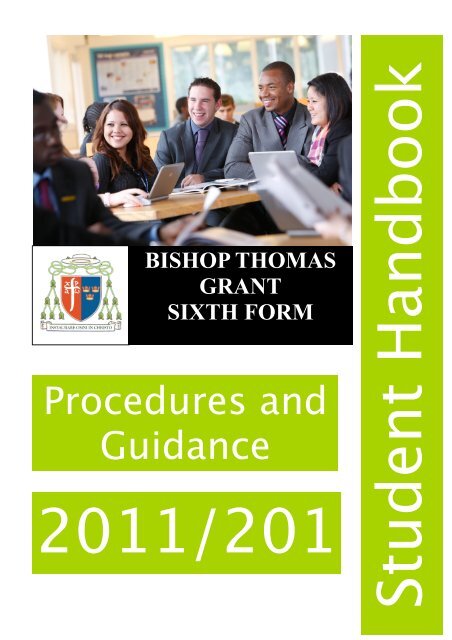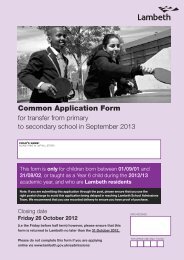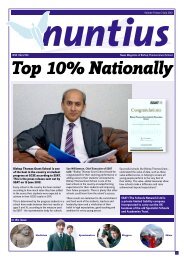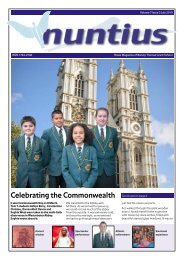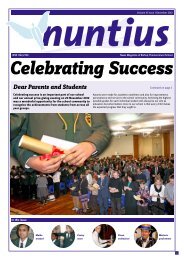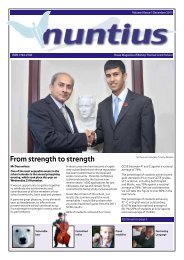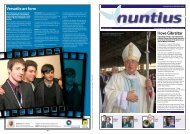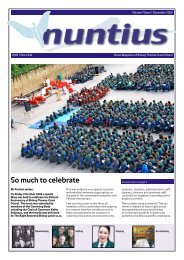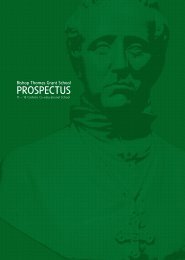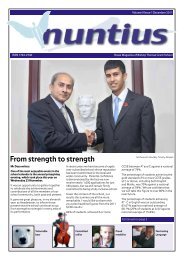STUDENT HANDBOOK 2011-12 - Bishop Thomas Grant School
STUDENT HANDBOOK 2011-12 - Bishop Thomas Grant School
STUDENT HANDBOOK 2011-12 - Bishop Thomas Grant School
Create successful ePaper yourself
Turn your PDF publications into a flip-book with our unique Google optimized e-Paper software.
BISHOP THOMAS<br />
GRANT<br />
SIXTH FORM<br />
Procedures and<br />
Guidance<br />
<strong>2011</strong>/201<br />
Student Handbook
WELCOME<br />
Dear Sixth Former,<br />
Firstly may I welcome you to the <strong>Bishop</strong> <strong>Thomas</strong> <strong>Grant</strong> Sixth<br />
Form and wish you luck with your Sixth Form studies.<br />
The contents of this handbook is intended to provide you with a<br />
guide to the ‘day to day’ matters involved in being a <strong>Bishop</strong><br />
<strong>Thomas</strong> <strong>Grant</strong> Sixth Form student. At <strong>Bishop</strong> <strong>Thomas</strong> <strong>Grant</strong>,<br />
we expect the very highest of standards from our students. We<br />
have these expectations because we want you to fulfil your<br />
hopes and ambitions in the time that you spend in the Sixth<br />
Form.<br />
As you progress through the Sixth Form, please remember that<br />
if you are facing any difficulties or have any anxieties, you<br />
should talk to your teachers. The staff members are here to<br />
help you and that is what they will do. There is never a problem<br />
that cannot be overcome.<br />
It is important that you work hard over the next one / two years.<br />
You should, however, make time to participate in some of the<br />
extra curricular events that form part of Sixth Form life.<br />
Finally, let me remind you that you are now the most senior<br />
students at <strong>Bishop</strong> <strong>Thomas</strong> <strong>Grant</strong> <strong>School</strong>. You must always<br />
remember that you have the privilege and responsibility of<br />
being a role model for the students in the lower school.<br />
Mr W Stapelberg<br />
Assistant Headteacher in charge of The Sixth Form<br />
2
CONTENTS<br />
Staff list 4<br />
History of <strong>Bishop</strong> <strong>Thomas</strong> <strong>Grant</strong> 4<br />
Mission Statement 5<br />
Code of Conduct & Expectations of students 6<br />
Rewards & Consequences 8<br />
Academic Monitoring 8<br />
3-2-1 Process 11<br />
Dress Code <strong>12</strong><br />
Student Cards 13<br />
Use of the Sixth Form Common Room & LRC 14<br />
Timing of the <strong>School</strong> Day & Key Dates and Holiday Dates 15<br />
Catholic Community & Community Code of Conduct 16<br />
Role Models & Your Timetable 16<br />
<strong>School</strong> Site Plan 17<br />
How hard do you need to work 18<br />
Grades, Targets, Reports and Parents’ Evenings 18<br />
Religious Studies & PSHCE/Careers 19<br />
Enrichment 20<br />
Service to <strong>School</strong> 20<br />
Prefects 21<br />
SL6 Collaboration 23<br />
Study time, exams & exam leave, part-time work 25<br />
Changing courses & Counselling 25<br />
Financial support, NUS & Oyster Cards 26<br />
Fire drill 27<br />
3
STAFF LIST<br />
HEADTEACHER<br />
Mr L Desa<br />
KEY MEMBERS OF STAFF<br />
Mr W Stapelberg – Director of Sixth Form<br />
Ms L Burnard – Joint Deputy Director of Sixth Form<br />
Mrs K Adam – Joint Deputy Director of Sixth Form<br />
Mrs Y Connolly – Deputy Head: Curriculum<br />
Ms M Murrey – Deputy Head: Pastoral<br />
Mr D O’Brien – Careers Co-ordinator, Head of Yr 11<br />
Mrs E Alleyne – Connexions Advisor<br />
Mr S Whitehead – RM Technician<br />
Ms M Campbell – Exams Officer<br />
Ms K Turvey – G&T Co-ordinator<br />
Ms J Buss – KS5 Academic Mentor<br />
SIXTH FORM TUTORS<br />
Year <strong>12</strong>:<br />
Year 13:<br />
To be confirmed<br />
Mr B Nisbet<br />
Mr A Ajose<br />
Mr T Myton<br />
Ms R Wells<br />
BISHOP THOMAS GRANT 1816 – 1870<br />
<strong>Thomas</strong> <strong>Grant</strong> was born in France of Irish parents on 25 November, 1816.<br />
Bernard, had fought at the Battle of Waterloo.<br />
His father,<br />
On leaving the army, Bernard <strong>Grant</strong> moved his family to Lancashire where <strong>Thomas</strong> received<br />
his elementary education. He later attended Ushaw College in County Durham and finally<br />
The English College in Rome, to complete his studies for the priesthood. He was ordained a<br />
priest in November 1841, aged 25 years.<br />
Over the next ten years, he earned great praise for his tactful and skilful handling of delicate<br />
matters regarding the restoration of the Roman Catholic Church in England. He was<br />
consecrated <strong>Bishop</strong> of Southwark in 1851. <strong>Bishop</strong> <strong>Thomas</strong> <strong>Grant</strong> was a well respected man,<br />
whose diplomacy gained him many friends. He worked to improve the living conditions of<br />
soldiers, prisoners and orphans.<br />
In 1870, Pope Pius IX called <strong>Bishop</strong> <strong>Thomas</strong> <strong>Grant</strong> to Rome to attend the First Vatican<br />
Council where shortly afterwards he became ill. He died in Rome on 1 st June, 1870. On<br />
hearing of his death the pope declared “another Saint in Paradise!”.<br />
<strong>Bishop</strong> <strong>Thomas</strong> <strong>Grant</strong> is buried in the grounds of Virgo Fidelis Convent, Upper Norwood.<br />
4
MISSION STATEMENT<br />
“INSTAURARE OMNI IN CHRISTO” (To unite all things in Christ. Ephesians 1, 10.)<br />
In putting into practice its motto, the school is participating in the Mission of the Church,<br />
conscious of the important part it has to play in supporting parents in handing on to the next<br />
generation, the great gift of faith.<br />
In implementing the Mission of the Church, “Go and make disciples of all nations,” Matthew 28,<br />
19, the <strong>School</strong> aims to play a key role in the formation of our young people so that they become<br />
responsible Christian adults. As such, they will be inspired by the message of Jesus Christ and<br />
will contribute effectively to the wider society by promoting justice, honesty and integrity in all<br />
aspects of their lives.<br />
The school will seek to achieve its mission in a number of ways.<br />
Every school day will begin with prayer: There will be regular worship through assemblies and<br />
weekly Masses. There will be opportunities to receive the Sacrament of Reconciliation and to<br />
participate in retreats and Days of Recollection.<br />
The <strong>School</strong> curriculum will give primacy of place to Religious Education, so that pupils develop<br />
a religious understanding of life. The Religious Education programme will support and<br />
encourage each pupil in his or her individual journey of faith. It will provide each pupil with a<br />
sound understanding of the teachings and practices of the Catholic Church and relate what is<br />
taught to their lives in the multi faith, multi cultural society in which we live.<br />
The <strong>School</strong> acknowledges each individual pupil as a unique creation of God. The curriculum,<br />
which is founded on the values of the Gospel will, therefore, give pupils a broad and balanced<br />
experience, enabling each pupil to fulfil his or her potential in all areas of study.<br />
Gospel values will also underpin relationships with the school community so that all members;<br />
pupils, parents and staff, will feel valued and respected and experience equality of opportunity<br />
within the context of the Catholic <strong>School</strong>. The school recognizes and values the role of parents<br />
as the first educators of their children, the teaching vocation and the contribution of the support<br />
staff and the chaplaincy team.<br />
The school will work collaboratively with parish clergy and parents to achieve effective homeschool-parish<br />
links and will provide a framework of discipline and a system of pastoral care and<br />
support for pupils and their families The variety of cultural backgrounds of our pupils and their<br />
families will be acknowledged and promoted. Through its structures, curriculum and<br />
interpersonal relationships, the school will enable its pupils to experience a worshipping, caring<br />
and educating community firmly founded on the person and teachings of Jesus Christ.<br />
‘I am the way, the truth and the life': John 14,6<br />
5
CODE OF CONDUCT<br />
At <strong>Bishop</strong> <strong>Thomas</strong> <strong>Grant</strong> <strong>School</strong> we value:<br />
- faith<br />
- seeing God in others<br />
- truthfulness and courage<br />
- keeping promises<br />
- respecting the rights and property of others<br />
- acting considerately, courteously and respectfully towards others<br />
- helping those less fortunate, weaker and less-able than ourselves<br />
- taking personal responsibility for one’s actions<br />
- self discipline<br />
- sincerity<br />
- working to the best of one’s ability<br />
- recognising and respecting any cultural differences<br />
- the right to learn<br />
- equality<br />
- being punctual to school and lessons<br />
- acceptable language at all times<br />
- a calm and quiet atmosphere in the school<br />
- our environment<br />
We reject:<br />
- prejudice - illegal actions - violence - racism<br />
- bullying or activities - irresponsibility - deceit<br />
- cheating - dishonesty - abuse of chemicals - cruelty<br />
- graffiti - bad language - litter<br />
EXPECTATIONS OF EACH <strong>STUDENT</strong><br />
1.Students are expected to treat all staff and their peers with respect and good manners at all<br />
times. Teachers’ instructions should be followed in full in relation to class, playground and all<br />
school related activities.<br />
2. All misunderstandings between students and staff need to be resolved with the staff<br />
member involved, at a mutually convenient time.<br />
3. There is a Sixth Form Dress Code that students need to adhere to. The purpose of this is to<br />
instil a sense of pride in our Sixth Form as well as to adequately prepare students for adultlife,<br />
the world of work and business.<br />
4.An excellent attendance and punctuality record is expected, in order to achieve each<br />
individual’s potential. <strong>School</strong> starts promptly at 8.45am. Students should travel quickly around<br />
the school to arrive promptly at lessons. Every absence must be explained by a phone call on<br />
the first day of absence by the parent/carer and by a note on the student’s return to school.<br />
Lateness should also be explained by a note.<br />
6
5.<strong>Bishop</strong> <strong>Thomas</strong> <strong>Grant</strong> accepts no responsibility for the security of valuable items and<br />
equipment. If a student brings such items into school, it is their responsibility to keep them<br />
secure; we can take no responsibility for such items lost.<br />
6.Computers are not to be used for illegal activities, games or entertainment purposes. Music<br />
is not to be downloaded as it causes storage problems. Food and drink are strictly forbidden in<br />
the ICT rooms, as well as in the LRC.<br />
7.Any item found must be handed in to the school office without delay. Students may enquire<br />
there for lost property.<br />
8.Students may eat and drink non-alcoholic beverages in the Sixth Form Common Room. All<br />
litter is to be placed in bins. Purchased food may not be taken out of the Common Room.<br />
9.Students are not allowed to eat or drink in the classrooms or corridors, with the exception of<br />
drinking water. Chewing gum is forbidden in school, as it is unsightly and results in damage<br />
that is expensive to remove.<br />
10. All students must act in an appropriate manner. Any unacceptable physical contact,<br />
even as a joke, will be regarded as a breach of school health and safety rules. The school<br />
community must be a safe and calm place for all in which to learn.<br />
11.Students must move briskly to their lessons at all times. There is a one-way system in<br />
place to ensure fast and efficient movement in between lessons.<br />
<strong>12</strong>.If a student feels ill, or has an accident, he/she must tell a teacher immediately. The<br />
student will be sent to the school office with a note. There are First Aid staff that will take care<br />
of students. Parents or carers will be contacted to collect their child if they are judged too ill to<br />
stay in school or who need non-urgent hospital treatment. In the case of a serious emergency<br />
an ambulance will be called and the parents or carers will be contacted immediately to tend to<br />
their child. Please ensure that contact numbers are accurate and up-to-date to save<br />
unnecessary delays; we must be able to contact a parent / guardian at ALL times.<br />
13.Medicines must not be brought into the school. If a student is required to take medication,<br />
a medical form must be completed by the parent or a doctor and given to the Director of Sixth<br />
Form, who will phone home to endorse this (the form is available from reception). As a result,<br />
all medication should be handed in to the <strong>School</strong> office, with the exception of inhalers, which<br />
may be kept by students during the day. The school will take no responsibility for the<br />
administration of any medications. There are strict rules relating to student medication – these<br />
are available on request.<br />
14.Alcohol, illegal substances or weapons are forbidden. The school operates a zero tolerance<br />
policy and students involved in related incidents will be subject to very serious sanctions. The<br />
Headteacher reserves the right to permanently exclude any student who is caught buying,<br />
selling, associating with, or using, illegal substances or weapons on the journey to school, in<br />
school, or on the way home from school.<br />
15.The graffiti of books, furniture and school property is forbidden and sanctions will be<br />
imposed and/or invoices will be issued to relevant students for repair or replacement.<br />
16.No ‘lasers’ are to be brought into school.<br />
17.Sixth Form students are allowed to leave the school during break time and lunchtime. It is<br />
up to the student to ensure that he/she is back in time for the start of lessons after break and<br />
lunch.<br />
18.Smoking is not allowed anywhere within the school premises. If students wish to smoke,<br />
they can do so during break and lunch, as long as they are not on site and are away from the<br />
school entrance.<br />
19.Each student must sign out officially at Main Reception if they are leaving school early. The<br />
Director of Sixth Form must endorse this personally. This is a Health & Safety requirement, as<br />
every person must be accounted for on the school site in case of fire or other safety risks.<br />
7
REWARDS<br />
At <strong>Bishop</strong> <strong>Thomas</strong> <strong>Grant</strong> you will be rewarded for various accomplishments. These include<br />
certificates for:<br />
- Best effort in subject<br />
- Best attainment in subject<br />
- Community and helpfulness<br />
At the end of each term, there will be a prize giving assembly where the following will be<br />
celebrated and rewarded with a certificate and a shopping voucher:<br />
- Best effort in subject<br />
- Best attainment in subject<br />
- Community & Helpfulness<br />
SANCTIONS/INTERVENTION<br />
You are expected to meet high expectations of dress, work and behaviour. You must attend all<br />
notified meetings. If you do not attend a meeting without a valid reason, staff will impose<br />
further sanctions.<br />
The 6 th form system of sanctions and intervention is divided into two sections:<br />
- Subject: Departments intervene where lack of progress or effort is identified<br />
- Pastoral: The 3-2-1 system after adequate intervention and sanctions were imposed<br />
without success.<br />
SIXTH FORM ACADEMIC MONITORING SYSTEM<br />
You are expected to complete your class work, homework and coursework to a standard that<br />
reflects your ability and by the required deadline. Subject sanctions and intervention are the<br />
responsibility of each department, who will deal with the problem first by scheduling catch-up<br />
sessions, detentions, contacting home and referring them to the Head of Department.<br />
Only after this has not worked, students will be referred to their form tutor who will then start<br />
with the Pastoral 3-2-1 process.<br />
You are also expected to come to lessons fully prepared. Each subject area will stipulate what<br />
equipment you will need and what needs to be done prior to your next class, in order to be fully<br />
prepared for lessons, which might include going through the next chapter, completing a<br />
research tasks, completing essays or activities or even preparing presentations. If students<br />
come to lessons unprepared, it is then expected that the teacher involved will ask for the<br />
student to come to see that teacher in one of the student’s non-contact lessons to catch up<br />
with the work. No student should be sent out of lessons to catch up with work, as more work<br />
will be missed in the interim period. This lesson does not have to be a teacher’s non-contact<br />
lesson and can happen during a lower school lesson in that particular teacher’s class.<br />
You will be asked to enter all known commitments for the week ahead into your planners, in<br />
order to avoid clashes between other detentions, meetings, school activities and especially<br />
8
out-of-school appointments. This is your responsibility. This applies to all meetings and<br />
detentions, including pastoral ones.<br />
If a student fails to turn up for this session without giving a valid reason prior to the session, the<br />
teacher can then organise a departmental detention. Departmental detentions are scheduled<br />
using a detention timetable. Each subject will have one day a week scheduled for detentions.<br />
The teacher who sanctioned the detention needs to ensure that the work missed, or<br />
inadequately completed, is available for the detention. It is down to the discretion of the Head<br />
of Department how long the student should stay. This can be decided in consultation with the<br />
teacher that sanctioned the student.<br />
If a student continuously fails to turn up for detentions, they will be referred to their form tutor,<br />
who will then start with the Pastoral 3-2-1 process.<br />
9
SIXTH FORM PASTORAL MONITORING SYSTEM<br />
You are expected to meet high expectations of dress, work and behaviour. At sixth form level,<br />
you are viewed as a young adult and your behaviour should portray this. If any student<br />
behaves in a way that conflicts with the expectations set out in the sixth form handbook, they<br />
will be requested to attend a meeting with their form tutor, who will start the 3-2-1 process.<br />
In the sixth form, you are not only expected to dress and behave appropriately, but to also be<br />
punctual and attend all of your lessons, every school day. At <strong>Bishop</strong> <strong>Thomas</strong> <strong>Grant</strong>, we have a<br />
policy of zero tolerance when it comes to attendance and punctuality. The procedures to deal<br />
with poor attendance and punctuality will also be dealt with through the 3-2-1 process.<br />
When students continue to breach the rules, a panel may request an appointment with the<br />
student and their parents/carers. In cases of serious or continued misbehaviour, an interview<br />
with the Headteacher will take place. Students may then be placed on a Pastoral Support<br />
Programme (PSP). This is in collaboration with the Local Authority.<br />
REGISTRATION All students are electronically registered at the start of each lesson. This is a<br />
legal requirement and ensures that all individuals are accounted for accurately on the school<br />
system.<br />
PUNCTUALITY This is an important part of self-discipline and is essential to good time<br />
management;<br />
• You should arrive at your form rooms by 8.40am at the latest. Registration begins at<br />
8.45am. If you are late, you must go to the foyer to sign in with the Attendance Officer.<br />
Regular lateness to school will result in students starting the 3-2-1 process.<br />
• You are expected to arrive punctually for all lessons. If you have been kept behind by a<br />
member of staff, an explanatory note from the teacher must be requested. Catch-up<br />
sessions can be organised by subject tutors for lateness to lessons.<br />
Target = 100% punctuality. This will be recognised and rewarded.<br />
ATTENDANCE Good attendance is associated with high achievement. Absence from school<br />
must be supported with a justifiable reason. Parents/guardians are expected to phone the<br />
<strong>School</strong> Attendance Officer (24 hour voicemail) on 0208 835 9213 before 8:40am on the first<br />
day of your absence and on subsequent days. On return to school, you should take a dated<br />
note to your Form Tutor, in order to authorise the absence. Dental or medical appointments<br />
should be made out of school hours or at weekends. If this is not possible or the<br />
appointment is urgent, you must bring a note from your parent/guardian with details of the<br />
appointment and a telephone number on which school staff can confirm your absence.<br />
Recreational holidays during term time are not an authorised reason for absence.<br />
Requests for such leave must be made in writing to the Head teacher in advance of the event.<br />
Target = 100% attendance. This will be recognised and rewarded.<br />
10
DRESS CODE<br />
Through our dress code we, at <strong>Bishop</strong> <strong>Thomas</strong> <strong>Grant</strong> <strong>School</strong>, would like to instil a sense of<br />
pride in our Sixth Form, as well as giving our students the adequate preparation for adult life,<br />
the world of work and the corporate business environment.<br />
You should meet the requirements of our dress code, as detailed in this document. As a young<br />
adult it is important that, through your presentation, you can show that you are serious about<br />
your future and therefore serious about how you portray yourself in and around school, as a<br />
role model. If you arrive at school and are in breach of the dress code you will be sent home<br />
to change into the appropriate attire. Unfortunately this will mean that you will miss out on<br />
important lessons and activities. If you are continuously in breach of the dress code, a<br />
meeting will be arranged with the Director of Sixth Form and your parents and appropriate<br />
measures will be taken to resolve the matter.<br />
Colour Option: Black, Dark Grey or Navy Blue for all attire.<br />
Ladies<br />
General attire • Smart tailored jackets.<br />
• Smart tailored trousers.<br />
• Smart tailored skirt of<br />
Or a<br />
appropriate length<br />
• Matching tailored suit (either<br />
Gentlemen<br />
• Smart tailored jacket<br />
• Smart tailored trousers<br />
skirt or trousers)<br />
Tie Optional Compulsory. Any choice of colour or school tie<br />
Or a<br />
• Matching tailored suit e.g. pinstripe<br />
for sixth form<br />
Jumper Plain v-neck, worn under jacket. Plain v-neck, worn under jacket.<br />
Shirt / Blouse<br />
Shoes<br />
Jewellery<br />
Any colour shirt or blouse. (No t-shirts, Any colour shirt. (No t-shirts, emblems or baggy<br />
emblems or baggy types). Tucked in.<br />
Smart shoes. (No canvas, trainers or<br />
casual type). Knee length boots in<br />
winter. (No ‘Ugg’ styles)<br />
•Minimal jewellery.<br />
• Subtle necklace / watch / ring.<br />
• No facial piercings, tattoos on<br />
show.<br />
Hats & scarvesOnly to be worn outside school.<br />
Coat<br />
Own style, worn outside the school.<br />
Must be taken off in assemblies and<br />
lessons.<br />
Hair • Simple styles.<br />
• No extreme or elaborate styles<br />
i.e. colour streaks/spikes<br />
• Subtle hair accessories.<br />
types). Tucked in.<br />
Smart shoes. (No canvas, trainers or casual<br />
type)<br />
No walking style boots.<br />
• No earrings.<br />
• Subtle jewellery i.e. watch and 1 ring<br />
• No facial piercings, tattoos on show.<br />
Only to be worn outside school.<br />
Own style worn outside the school.<br />
Must be taken off in assemblies and lessons.<br />
• Simple styles.<br />
• No extreme or elaborate styles.<br />
• No plaits, dye, gelled spikes or no 1 or 2<br />
cut.<br />
• Hair length 2” maximum<br />
<strong>12</strong>
Make-up<br />
Subtle and simple.<br />
No make-up.<br />
No bright colours i.e. black or red nails<br />
or long extensions.<br />
Prefects Badges or ties to be worn. Ties to be worn. Badges optional<br />
Accessories<br />
No sunglasses in the building.<br />
No mobile phones and/or earphones<br />
are allowed around the school.<br />
Mobile phones are only allowed in the<br />
common room.<br />
This code does not allow:<br />
• Jeans of any description<br />
• Skinny trousers of any description<br />
• Revealing tops (i.e. bare midriff)<br />
• Tight fitting skirts<br />
• Leather trousers or skirts<br />
• Extremely short skirts<br />
• Peddle pushers<br />
• Extreme belts or accessories<br />
• Cardigans / jumpers<br />
• Hoodies<br />
• Explicit and unacceptable emblems / slogans<br />
Consequences of not following the dress code:<br />
No sunglasses in the building.<br />
No mobile phones and/or earphones are allowed<br />
around the school.<br />
Mobile phones are only allowed in the common<br />
room.<br />
• Form teachers will send students who are not properly dressed to the Deputy Directors<br />
or the Director of Sixth Form, who will log it on the school system and will send students<br />
home to change their clothes. Students sent home will have to make it back to school<br />
before break time at 10.45am and report to either the Deputy Directors or Director of<br />
Sixth Form. Parents will be informed by telephone.<br />
• Any jewellery / accessories mentioned will be confiscated and will only be returned at the<br />
Director of Sixth Form’s discretion.<br />
<strong>STUDENT</strong> CARDS<br />
You are expected to wear your student ID cards at all time. This entitles you to access the<br />
school site. As it is the main way in which we can protect you from intruders, you may be<br />
challenged to prove your identity, if your ID card is not visible and you will be expected to be<br />
able to produce your card for any member of staff who requests it. You will be given a warning<br />
on the first occasion you fail to wear the card and will be sent home on the second occasion.<br />
Your ID card will contain a microchip which will allow you access to corridors and walkways<br />
which are not used by the rest of the school. It is your responsibility to keep this safe and to<br />
use it wisely. If you lose yours, you will be requested to purchase a new one from the school<br />
bursar. If you are seen to misuse the privilege, the chip will be deactivated and you will lose<br />
the right to the easier access around the school. Replacement ID cards and lanyards will cost<br />
you £7.<br />
USE OF THE SIXTH FORM COMMON ROOM<br />
13
The Common Room is an area where you can relax outside of normal lessons. This includes<br />
free periods, break time and lunchtime. Only sixth formers are allowed in the common<br />
room; all other year groups are not.<br />
A selection of hot and cold food and drinks is available in the common room. It is up to each<br />
sixth former to dispose of all packaging and other litter in the bins provided. If anyone is seen<br />
to misuse the common room, or deliberately vandalise or litter, they will lose the right to use<br />
the common room. In the Common Room, you can pay by cash or you can set up a pre-pay<br />
cashless account, which uses biometric finger scanning to pay for items.<br />
It is important to note that visitors are not permitted in the common room, unless authorised by,<br />
and under the constant supervision of, a member of staff. This includes friends, relatives and<br />
former <strong>Bishop</strong> <strong>Thomas</strong> <strong>Grant</strong> pupils. This is in order to maintain our safe and secure learning<br />
environment.<br />
USE OF THE LEARNING RESOURCES CENTRE<br />
The LRC is a space to be used for private study and research. There are numerous PC’s in<br />
the LRC, along with adequate space for you to use and charge your own laptops. The LRC is<br />
a study area, so no talking is allowed. The LRC opening times are 8am - 5pm Monday to<br />
Friday. A Librarian will be present and will be available to assist you during the school day.<br />
The Director of Sixth Form’s office is located in the LRC and you will be able to meet with him<br />
there during his non-teaching lessons. The Sixth Form Administration Office is also situated in<br />
the LRC.<br />
Food and drink are not allowed in the LRC. If you are found eating or drinking in the LRC, you<br />
will be asked to leave. If you are a repeat offender, you will loose the right to use the LRC.<br />
The use of mobile phones or any other digital devices are against school rules and will be<br />
confiscated on sight.<br />
SCHOOL ROUTES<br />
All students must follow the one-way system in operation in the school building, with the<br />
exception of prefects and register monitors.<br />
Years 7, 8 and 9 leave school via the Main Gate<br />
Years 10 and 11 leave school via Hill Path<br />
Sixth Form via the Main Gate and Hill Path<br />
8:40 am Bell – Students make way to registration<br />
8.45 am Gates close<br />
8:45 – 9:05 am Morning Registration/Assemblies<br />
9:05 – 9:55 am Lesson 1<br />
9:55 – 10:45 am Lesson 2<br />
10:45 – 11:05 am Break<br />
11:05 – 11:55 am Lesson 3<br />
11:55 am – <strong>12</strong>:45 pm Lesson 4<br />
14
TIMING OF THE SCHOOL DAY<br />
KEY DATES<br />
Induction day - Year <strong>12</strong> Wednesday 7 September <strong>2011</strong><br />
Team Building Day – Year <strong>12</strong> Thursday 8 September <strong>2011</strong><br />
Study Skills conference – Year <strong>12</strong>: Friday 9 September <strong>2011</strong><br />
Induction day – Year 13: Friday 9 September <strong>2011</strong><br />
Start of Years <strong>12</strong> & 13 lessons:<br />
Monday <strong>12</strong> September <strong>2011</strong>, 8.40am<br />
Welcome Mass – Year 13: Friday 9 September <strong>2011</strong><br />
HOLIDAY DATES <strong>2011</strong> – 20<strong>12</strong><br />
Autumn Term <strong>2011</strong> Tue 6 September – Fri 16 December <strong>2011</strong><br />
Half Term: Mon 24 – Fri 28 October <strong>2011</strong><br />
SL6 Inset Day: Fri 11 November <strong>2011</strong><br />
Spring Term 20<strong>12</strong> Wed 4 January – Friday 30 March 20<strong>12</strong><br />
Half Term: Mon 13 – Fri 17 February 20<strong>12</strong><br />
Inset Days: Tue 3 January 20<strong>12</strong> & Mon 20 February 20<strong>12</strong><br />
Summer Term 20<strong>12</strong> Mon 16 April – Fri 20 July 20<strong>12</strong><br />
Half Term: Mon 4 – Fri 8 June 20<strong>12</strong><br />
May Bank Holiday: Monday 7 May 20<strong>12</strong><br />
Queen’s Jubilee Bank Holiday: Tuesday 5th June 20<strong>12</strong><br />
CATHOLIC COMMUNITY<br />
<strong>Bishop</strong> <strong>Thomas</strong> <strong>Grant</strong> has an established and esteemed tradition, spanning fifty years, of<br />
service to the Catholic population of South London. Students are given many opportunities for<br />
moral and spiritual reflection.<br />
• Every Wednesday morning priests from local parishes say Mass at 8.10am. All<br />
students have access to our on site chapel.<br />
• Staff and students share their Christian faith during assemblies as well as during<br />
registration periods every day.<br />
• Students have regular opportunities to receive the Sacraments of Reconciliation and<br />
Communion.<br />
15
The school supports local, national and international charities. Students serve their local<br />
community on numerous occasions throughout the school year.<br />
COMMUNITY CODE OF CONDUCT<br />
On your journey to and from school, please be reminded of the following:<br />
• Whilst in Sixth Form dress, students represent <strong>Bishop</strong> <strong>Thomas</strong> <strong>Grant</strong> <strong>School</strong>. Wear it<br />
with pride, in a tidy and appropriate manner. Wear appropriate full school uniform at all<br />
times<br />
• Always walk in a safe and orderly fashion. Do not form large and rowdy groups that can<br />
cause intimidation<br />
• Form calm, orderly queues at bus stops. Do not jostle or push when boarding a bus.<br />
Allow members of the public onto buses first<br />
• Do not shout, scream or use offensive language<br />
• Always act in a courteous manner, especially with members of the public<br />
• Do not loiter on pavements or outside shops and make your way quietly and directly<br />
• Avoid designated “problem areas” at all times (Streatham Ice Rink and Crown Point)<br />
• Absolutely no physical contact, even as a joke<br />
• Always be vigilant when crossing the roads; use the highway safety code at all times<br />
• It is your duty to report any misbehaviour of other students to the school as soon as you<br />
can safely<br />
• Students who bring the good name of the school into disrepute by fighting or being in<br />
attendance at any scene outside the school will be sanctioned with a fixed term or<br />
permanent exclusion<br />
ROLE MODELS<br />
Sixth Form students are the most senior students of <strong>Bishop</strong> <strong>Thomas</strong> <strong>Grant</strong>. You are therefore<br />
role models for the students lower down in the school. This is why it is so important for you to<br />
set a good example when you move around the school. Sixth Formers do have privileges but<br />
this does not make it appropriate to abuse those privileges.<br />
YOUR TIMETABLE<br />
• 6 periods per week per subject<br />
• 3 periods per week Block E (+ 2 periods during Enrichment time for some subjects)<br />
•1<br />
16
period per week General Religious Education<br />
• 1 period per week PSHE/Careers<br />
• 2 periods per week Enrichment<br />
17<br />
Common Room
HOW HARD DO YOU NEED TO WORK<br />
You should expect, on average, to spend about five hours per week, per subject, on self-study<br />
at home or in the LRC. Remember, being in a Sixth Form is a full-time job and it must take<br />
priority in your life. There is a big difference between Sixth Form courses and GCSE level<br />
work. You really need to keep on top of your studies from the very start and always take the<br />
advice of your teachers. There is a tendency for some students to ‘take their foot off the<br />
accelerator’ after GCSE’s. Do not let that happen to you during Year <strong>12</strong>.<br />
GRADES, TARGETS, REPORTS AND PARENTS’ EVENINGS<br />
GRADES<br />
Grades at A Level are different from those at GCSE<br />
A Level pass grades range from A* to E<br />
BTEC grades are Pass, Merit and Distinction<br />
TARGETS<br />
When you begin your Sixth Form courses, you will be given a target in each of your Sixth Form<br />
subjects. The target is worked out by using a system called ALIS (A Level Information System).<br />
This system uses GCSE results to project what a student gaining certain GCSE grades is<br />
statistically likely to achieve in any A Level / BTEC course. If you are not happy with the target,<br />
it unfortunately cannot be changed; this is because it is based on your past performance.<br />
However, you can beat your target.<br />
It is also worth remembering that your predicted grade for your university application is based<br />
on your performance up to the end of Year <strong>12</strong>, not on your target grade.<br />
REPORTS<br />
A report will be sent home to your parents/carers at the end of every half-term. This will<br />
comment on your attitude and progress towards your individual subject targets and your<br />
achievements in your assessments. Your attendance and punctuality for each half term will<br />
also be recorded. Your Form Tutor will discuss your report with you and you will identify<br />
strategies for improvement.<br />
PARENTS’ EVENINGS<br />
Parents’ Evenings are considered to be one of the most important parts of every student’s<br />
development. We expect Sixth Formers to come with their parents. Even though you are<br />
Sixth Formers, you are still dependent on the support of your parents. It is very important that<br />
they understand how you are progressing, so that they can help you as effectively as possible<br />
Year <strong>12</strong> Parents’ Evening: Tuesday 13 December <strong>2011</strong><br />
Year 13 Parents’ Evening: Thursday 15 March 20<strong>12</strong><br />
RELIGIOUS EDUCATION<br />
Essentially, Core Religious Education (one compulsory period per week) is an opportunity for<br />
you to reflect upon a variety of issues and questions linked to religion, morality and spirituality.<br />
The blend of topics and activities allows you to engage with subjects that you may not<br />
18
ordinarily come across in the course of your formal AS / A-Level / BTEC studies, whilst in the<br />
Sixth Form.<br />
Core Religious Education allows you to explore your own beliefs across a wide range of<br />
issues. It encourages you to develop skills of confidence and communication in a relaxed,<br />
friendly and supportive environment.<br />
Your group will meet once a week and you will take part in discussions and debates. You will<br />
explore issues of concern to all major world religions, whilst being firmly rooted in Catholic<br />
tradition. This time is not for indoctrination but rather for the opening up of listening, discussion<br />
and reflection.<br />
PSHCE/CAREERS<br />
You will have one period a week of PSHE/Careers. This is a full programme of activities and<br />
events comprising outside speakers who will address key, contemporary and pertinent issues,<br />
such as university preparation, interview skills, careers, substance and alcohol abuse,<br />
personal financial management, health issues, personal safety, charity work and gap year<br />
activities.<br />
Careers guidance throughout Years <strong>12</strong> & 13 is prioritised and aims to help you to make<br />
informed career choices. Application to Higher Education and degree courses is actively<br />
encouraged and fully supported. You will have the opportunity to attend a Higher Education<br />
Conference at the end of Year <strong>12</strong>, where you can get detailed information on courses and<br />
universities, as well as attend master classes on various degree courses.<br />
The timetable for the PSHE/Careers programme at BTG will be generally as follows:<br />
YEAR <strong>12</strong>:<br />
1 st half of Autumn Term: Study Skills<br />
2 nd half of Autumn Term: Stress Management & Exam skills<br />
Spring Term:<br />
Speakers from businesses and HE establishments<br />
Summer Term:<br />
UCAS preparation and application<br />
YEAR 13:<br />
1 st half of Autumn Term: UCAS application & student finance<br />
2 nd half of Autumn Term: What happens after school?<br />
1 st half of Spring Term: Citizenship<br />
2 nd half of Spring Term: Life skills<br />
ACADEMIC MENTORING<br />
The Academic Mentoring programme will provide an opportunity for you to gain help, support<br />
and guidance during your career in the Sixth Form. The programme is designed to provide<br />
help with a range of different aspects of life in the Sixth Form, including individual target<br />
setting, coursework planning and management, time management and career/university<br />
applications, as well as the crucial area of deciding upon, and following, the learning strategies<br />
which best suit you as an individual. In this way, it is hoped that you will use it as an<br />
opportunity to help you to improve the standard of your work.<br />
The programme is designed to follow a similar format to that in Higher Education. Students are<br />
referred to the Academic Mentor through the pastoral system or you can self- refer.<br />
In the meeting, your mentor and yourself will raise and discuss issues concerning your<br />
progress, your learning and study, the standard of work, celebrating your successes and finding<br />
19
ways of helping you with problems. It also provides an opportunity to talk about your views,<br />
concerns and aspirations, your interests inside and outside school including any issues or<br />
concerns that may be impacting on your involvement in the Sixth Form<br />
ENRICHMENT<br />
Enrichment courses are key factors in UCAS applications. Every Wednesday afternoon the<br />
timetable will be collapsed in order to allow you to take part in the Enrichment Programme.<br />
This programme offers you the opportunity to develop skills and interest which compliment<br />
your main programme of study. You will follow an enrichment course every year, chosen from<br />
a wide variety of options.<br />
During the first Enrichment session of the year, you will attend a presentation in the main hall<br />
on the various activities available at BTG and will then make your choice of activity for the year<br />
ahead.<br />
YEAR <strong>12</strong> SERVICE TO SCHOOL<br />
As a Year <strong>12</strong> student in a Catholic <strong>School</strong> you will have the automatic responsibility of being<br />
involved in the school community. This will also enable you to build a presence in the school<br />
amongst staff and students, as role models for the rest of the school to look up to.<br />
Every half term you will be allocated to one of the six areas explained below. This is compulsory<br />
and should be done diligently and without fail. Teachers will also be allocated in these areas and<br />
it is your responsibility to ensure that the duties are executed effectively. Each Year <strong>12</strong> student<br />
will receive a service to school logbook in where the teacher allocated to that area will sign so<br />
that your form tutor can monitor your attendance and involvement. Form tutors will monitor<br />
these logbooks every week and the Deputy Directors of Sixth Form will do spot checks of form<br />
groups throughout the week to see how the service to school is being executed and recorded.<br />
If you fail to turn up to your allocated area, you will have to carry out these duties at<br />
another time during the week, as allocated by your form tutor. If you continuously miss<br />
your duty, you will go on 3 – 2 – 1.<br />
At the end of each half term, you will be allocated to a new activity for the next half term. This<br />
will be a rolling process throughout the year. During exam leave you will not be required to do<br />
the duties, but it will resume on your return to school and will continue up to the end of Year <strong>12</strong>.<br />
1) Late Duty: 8.45am – 9.05am<br />
Two students will assist a teacher once a week at the gate to prevent students avoiding<br />
signing in late by entering the building elsewhere. Their main duty will be to ensure that<br />
students make their way to the foyer. (10 students)<br />
Two students will assist a teacher once a week in the foyer to sign students in as late.<br />
These lists should then be handed in to the Attendance Officer. (10 students)<br />
2) Canteen Support (Mentor and Support Year 11 Prefects):<br />
Break 10.45am – 11.05am: Two students will assist a teacher once a week in each<br />
canteen to ensure that students line-up and exit properly and clear up when they leave.<br />
(20 students)<br />
Lunch <strong>12</strong>.45 – 1.05 pm: One student will assist teachers once a week in each canteen to<br />
ensure that students enter canteen properly and clear up when they leave. (10 students)<br />
Lunch 1.05 – 1.35pm: One student will assist a teacher once a week in each canteen to<br />
ensure that students enter canteen properly and clear up when they leave. (10 students)<br />
20
3) LRC Supervision:<br />
Lunch <strong>12</strong>.45 – 1.05pm: One student will assist the librarian and the Library prefects to<br />
ensure that students remain silent in the library and behave appropriately. (10 students)<br />
Lunch 1.05 – 1.35pm: One student will assist the librarian and the Library prefects to<br />
ensure that students remain silent in the library and behave appropriately. (10 students)<br />
4) Common Room Management:<br />
Break 10.45 – 11.05am: Two students will assist a teacher once a week to ensure sixth<br />
formers leave the common promptly for lessons and leave area tidy. (10 students)<br />
Lunch 1.20 – 1.35pm: Two students will assist a teacher once a week to ensure sixth<br />
formers leave the common promptly for lessons and leave area tidy. (10 students)<br />
5) Heads of Years 7 - 11 Support:<br />
Four students will be assigned to each Head of Year and will be allocated specific<br />
support tasks to be carried out throughout the week such as lining up for assemblies and<br />
silent exit of the hall. This will be decided by the Heads of Year. (20 students)<br />
6) Heads of Houses Support:<br />
Two students will be assigned to each Head of House and will be allocated specific<br />
support tasks to be carried out throughout the week and will support PE House activities.<br />
This will be decided by the Heads of House and Miss Murray. (8 students)<br />
At the end of the year at the final whole school assembly each Year <strong>12</strong> student will receive a<br />
certificate for their commitment to aid and serve the school community. This will be a valuable<br />
award to use in UCAS applications.<br />
PREFECTS<br />
During the first few weeks of doing Service to <strong>School</strong>, the Sixth Form Pastoral Team will meet<br />
and decide on students to become Senior Prefects of the school. This will be announced at an<br />
Upper <strong>School</strong> Assembly before the October half-term.<br />
Some students will also be nominated as Head Boy and Girl and these students will have to<br />
complete an application letter and do an interview with the Sixth Form Pastoral Team. The new<br />
Head Boy and Girl will be announced at an Upper <strong>School</strong> Assembly after the October half-term.<br />
Senior Prefects will continue with their duties until the October half-term of the following year<br />
when they will hand over to the newly selected Senior Prefects. Similarly, the Head Boy and Girl<br />
will continue their duties until the new Head Boy and Girl is selected after the October half term<br />
of the following year.<br />
1. HEAD BOY & GIRL (Year <strong>12</strong>) – JOB DESCRIPTION<br />
The ideal Head Prefect will have good organisational and oral skills and will have demonstrated<br />
their ability to motivate a team. They will be passionate about their work and demonstrate the<br />
ability to manage their time effectively as well as show clear leadership skills.<br />
1. To represent BTG at open sessions and special events, in and out of school, including at<br />
primary schools.<br />
2. To speak publicly about the school and on a number of issues.<br />
3. To be an ambassador for the school and a role model for younger students.<br />
4. To take responsibility for the whole Prefect Team (Years 11 & <strong>12</strong>) in an executive role.<br />
21
5. To line manage the Senior Prefects and Deputy Head Boy & Girl to ensure consistency in<br />
duty system.<br />
6. To monitor a code of conduct for prefects<br />
7. To meet with the Pastoral Deputy Headteacher once a week.<br />
2. SENIOR PREFECTS – JOB DESCRIPTION<br />
The ideal senior prefect will have good oral skills and will have demonstrated their ability to<br />
motivate a team. They will be passionate about their work and demonstrate the ability to<br />
manage their time effectively. They would have executed their service to school very well and<br />
set a positive example to all sixth formers through their conduct and demeanour.<br />
1. To line manage and support the Year <strong>12</strong> service to school to ensure consistency.<br />
2. To support the Year 11 prefect system.<br />
3. To monitor the code of conduct of Year <strong>12</strong> students<br />
4. To work closely with Heads of Year and assist in assemblies and other activities around the<br />
school<br />
5. To work closely with Heads of Houses to assist activities during Fundraising week<br />
6. To help during open evenings and special events<br />
7. To complete tasks as expected by the Senior Management Team of the school<br />
22
SL6 COLLABORATION<br />
The SL6 (South London Sixth) collaboration is a partnership between Dunraven, La Retraite,<br />
St Martin-in-the-Field <strong>School</strong> and <strong>Bishop</strong> <strong>Thomas</strong> <strong>Grant</strong> <strong>School</strong>, whose motto is “Sharing<br />
Excellence”. The collaboration works at many levels. For students, the main advantages are:<br />
• A wider choice of subjects available<br />
• Increased flexibility in setting up an appropriate timetable<br />
• The chance to meet new people and experience the ethos of another school<br />
• A wider choice of Enrichment and extra-curricular activities<br />
Studying in a different environment can be a very positive experience, which would offer you<br />
the chance to develop your interpersonal skills, so we would suggest that you try to not be too<br />
shy about talking to people in your host school, if you want to make the most of the<br />
experience. You would be given an induction at the other school and you would be matched<br />
up with a ‘buddy’ who would help you around for the first two weeks.<br />
In order to have a successful collaboration which provides benefits for all involved, we ask all<br />
students studying subjects at the other colleges within the SL6 to take note of the following:<br />
1. WELCOME<br />
You will have a short induction session at your host school, during your first lesson at the<br />
host school. Use this time to make sure you know your way around the school in general<br />
and the Sixth Form area in particular. Ask about how to use the Common Room, the<br />
computers, the library, the Cafeteria/Canteen etc. Find out the names of your teachers and<br />
who to phone if you are going to be absent.<br />
2. PROBLEMS<br />
If you have a problem at your host school, please tell your tutor or a teacher or the Director<br />
of Sixth Form in either of your SL6 schools. If you fail to attend classes or fall behind with<br />
your work, this will be followed up in the same way as it would be in your home school. If<br />
you behave in a way which contravenes the SL6 code of conduct, you will be given a<br />
warning. Repeated breaches of the code of conduct can lead to you losing your place in<br />
SL6.<br />
3. REGISTERING AND SIGNING IN<br />
You will need to sign in and out at the Reception of your host school for health and safety<br />
purposes. You will then be registered in your lesson and your attendance data will be<br />
shared with BTG, to be incorporated on your home school attendance record.<br />
GETTING TO THE SL6 HOST SCHOOL<br />
For lessons starting Period 1, you make your own way to the host school. When a lesson<br />
ends at Period 6, you make your own way home. For all lessons beginning after break or<br />
lunch, the SL6 minibus service will take you free of charge between the four Sixth Form<br />
Centres. The departure times are published at Reception and the bus will not wait for<br />
latecomers. If you miss the bus, you are responsible for making your own way there and<br />
back. Please note that there are no parking facilities for students with cars or motorcycles<br />
at any of the SL6 schools.<br />
4. VISITS AND ACTIVITIES<br />
23
If your host school subject teachers are organising a visit or educational activity, they will<br />
include you in the group. Please make sure that your Form Tutor and Director of Sixth<br />
Form at your home school are informed well in advance of the visit.<br />
5. STAFF ABSENCE AND COVER WORK<br />
If a member of staff knows that they are going to be absent and can give you cover work in<br />
advance, you may ask your Director of Sixth Form for permission to stay in your home<br />
school to complete the work. If the absence is not known beforehand, you will be expected<br />
to stay at the host school and complete the cover work there; make sure you are<br />
registered.<br />
6. PROGRESS GRADES, UCAS REPORTS AND EXAM ENTRIES<br />
Progress grades for your host school subject will appear on your normal home school<br />
report. You will take your examination in the host school for the subject that you study<br />
there and your teachers will remind you of the dates and times. The examination entry<br />
confirmation slip will be given to you by the Examinations Officer in your home school.<br />
7. PARENTS’ CONSULTATION EVENINGS<br />
Your parents will be invited to attend the Parents’ Consultation Evenings at both your<br />
schools.<br />
8. EMERGENCIES<br />
Please make sure that you inform both schools of any change of address or contact details.<br />
If you need to carry medication, please ensure that both schools know about this.<br />
The contact details for the Directors of Sixth Form are:<br />
Mr Willem Stapelberg<br />
Director of Sixth Form<br />
<strong>Bishop</strong> <strong>Thomas</strong> <strong>Grant</strong> <strong>School</strong><br />
Belltrees Grove London SW16 2HY<br />
0208 835 9246<br />
Mrs Emma Hannon<br />
Director of Sixth Form<br />
La Retraite <strong>School</strong><br />
Atkins Road London SW<strong>12</strong> 0AB<br />
0208 673 5644<br />
Mr Mark Dewey<br />
Director of Sixth Form<br />
St Martin’s in the Fields <strong>School</strong><br />
Tulse Hill London SW2 3UP<br />
0208 683 9465<br />
Mr Safras Cuffy<br />
Director of Sixth Form<br />
Dunraven <strong>School</strong><br />
94-98 Leigham Court Road London SW16 2QB<br />
0208 677 2431<br />
24
STUDY TIME<br />
You will have allocated study periods per week. The LRC has lots of space for private study<br />
and some computers and each student may have their own laptops to use around the school.<br />
You are not allowed to leave the school during your study periods. At <strong>Bishop</strong> <strong>Thomas</strong> <strong>Grant</strong><br />
<strong>School</strong> we care, first and foremost, about your education and that is why you will have these<br />
excellent study facilities at your disposal.<br />
The more work you complete at school, the less work you will need to take home.<br />
EXAMINATIONS AND STUDY LEAVE<br />
Public examinations are held in January and June.<br />
In most AS Level subjects you will be entered for exams in January. If you do not pass the<br />
January modules successfully, you may be re-entered for the exam in June, when you also<br />
take the remaining modular AS exams. The A2 exams are taken at the same time in the<br />
following year. You will be notified nearer to the time when Study Leave is to take place.<br />
PART-TIME WORK<br />
Some of you will already have part-time jobs whilst others will be looking for a part-time work in<br />
due course. Please be sensible about this. The main point of being in the Sixth Form is to<br />
gain a good education. Studying A Level and BTEC courses is a full-time job in itself.<br />
Part-time work, while a good experience, can be tiring and inhibits your free time. You need to<br />
have time to study at home and you need time to relax as well. Too much time spent on parttime<br />
work can upset your equilibrium.<br />
It is recommended that the absolute maximum time you spend on part-time work is eight hours<br />
per week.<br />
CHANGING COURSES<br />
When you enrol for the Sixth Form, everything is done to ensure that each student is on<br />
courses that are suitable for their ability and meet their interests and aspirations. However, it<br />
does occasionally happen that after one or two weeks a student feels that they have made a<br />
mistake.<br />
If this happens to you, this is what you must do:<br />
• Ask your subject teacher to discuss your concerns<br />
• Talk to the Head of Subject of the course you wish to change to.<br />
• Discuss the matter with your Form Tutor if you still wish to change course.<br />
• Complete the form “Changing courses” that can be found in the LRC and submit it to the<br />
Director of Sixth Form and a decision will be made.<br />
25
COUNSELLING<br />
From time to time students can feel weighed down by something happening in their life that<br />
they feel unable to cope with. If this sounds familiar, please either talk to your Form Tutor,<br />
Head of Year or a teacher that you feel you can trust.<br />
If a teacher thinks that you may benefit from seeing a counsellor, the Director of Sixth Form<br />
can make special arrangements, in complete confidence. You would not be the first person<br />
with a difficulty to sort out and you would not be the last. Whatever the problem, talk to<br />
someone that you can trust.<br />
FINANCIAL SUPPORT<br />
EMA (EDUCATIONAL MAINTENANCE ALLOWANCE)<br />
Summary of changes<br />
In October 2010 the Government took the decision to close the Education Maintenance<br />
Allowance (EMA) scheme at the end of this current Academic Year.<br />
Since then the Government has announced a new Bursary Fund to help the most vulnerable<br />
16-19 year-olds continue in full-time education, together with transitional arrangements to help<br />
some of those who are currently in receipt of EMA.<br />
The additional transitional arrangements are to help those students currently receiving EMA.<br />
They consist of two parts:<br />
• Students who first successfully applied for EMA in 2009/10 will continue to receive<br />
payments at the same level until the end of the <strong>2011</strong>/<strong>12</strong> academic year provided they<br />
have entitlement running into that year under the EMA Guarantee (and if their age allows<br />
this entitlement)<br />
• Students who first successfully applied for EMA in 2010/11 and who were awarded the<br />
maximum weekly EMA payment of £30 will be eligible for £20 each week they are in<br />
education or training until the end of the <strong>2011</strong>/<strong>12</strong> academic year (and if their age allows<br />
this entitlement).<br />
Students who first successfully applied for an EMA payment of £20 or £10 in 2010/11 will not be<br />
eligible for transitional support in the <strong>2011</strong>/<strong>12</strong> academic year, but may benefit from the new<br />
16-19 Bursary Fund. More information about this will be sent to students in due course.<br />
NUS CARDS<br />
Application forms will be handed to you by your Form Teacher for a National Union of Students<br />
card, or an NUS Extra card. Owning such a card entitles you to student discounts for a variety<br />
of things, including cinema tickets and air travel. Application forms will also be available in the<br />
LRC.<br />
OYSTER CARDS<br />
Application forms for Oyster cards can be obtained from The Post Office. The application must<br />
be completed by the student and signed by the 6 th Form Administration Assistant. Do not ask<br />
26
another member of staff to sign your application, as your address needs to be verified by our<br />
Sixth Form Administrator and London Transport will not recognise all other staff members as<br />
authorised signatories and your application could be discarded.<br />
OTHER GRANTS AND ASSISTANCE<br />
There are other means of obtaining financial support, such as the Wandsworth Transport<br />
Allowance and the Lambeth Foundation <strong>Grant</strong>s. All such schemes are advertised in the LRC<br />
as soon as the information becomes available.<br />
FIRE DRILL<br />
The main priority of the fire drill is to evacuate the building and register all students to see if<br />
any are missing, as quickly as possible. Pupils assemble in the relevant playground in their<br />
year groups at form group muster points, shown by white lettering on green signs in the upper<br />
and lower playgrounds. The Sixth Form register at the end of the Lower Playground, with Mr<br />
Stapelberg, Mrs Burnard and Mrs Adam. It is for this reason that it is absolutely crucial that<br />
students sign in and out when entering and leaving the school site. There will be sanctions<br />
given for students that do not adhere to the fire regulations and it can of course lead to more<br />
serious consequences.<br />
THANK YOU FOR TAKING THE TIME TO READ THROUGH YOUR<br />
<strong>HANDBOOK</strong>. PLEASE FOLLOW THE PROCEDURES AS AVISED AND USE<br />
THE FACILITIES AT BTG TO YOUR BEST ADVANTAGE AND KEEP YOUR<br />
<strong>HANDBOOK</strong> HANDY FOR FUTURE REFERENCE. WE SINCERELY HOPE<br />
THAT YOU ENJOY AND FLOUISH AT YOUR TIME IN BTG SIXTH FORM.<br />
27
<strong>Bishop</strong> <strong>Thomas</strong><br />
Student Hand Book<br />
BISHOP THOMAS GRANT SCHOOL<br />
BELLTREES GROVE, LONDON SW16 2HY<br />
Tel: 020-8769 3294 Fax: 020-8769 4917<br />
Web: www.btg.ac<br />
28


